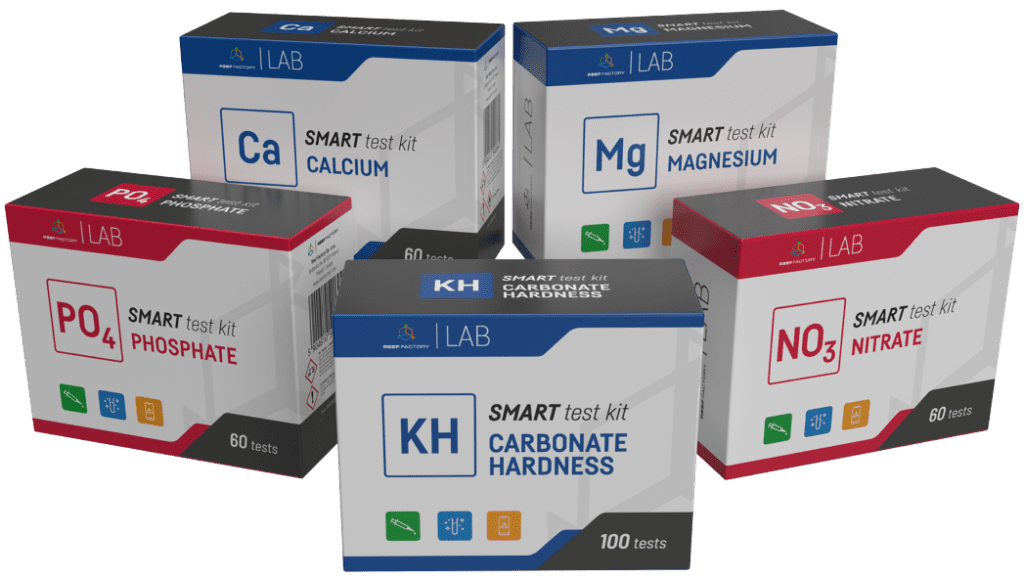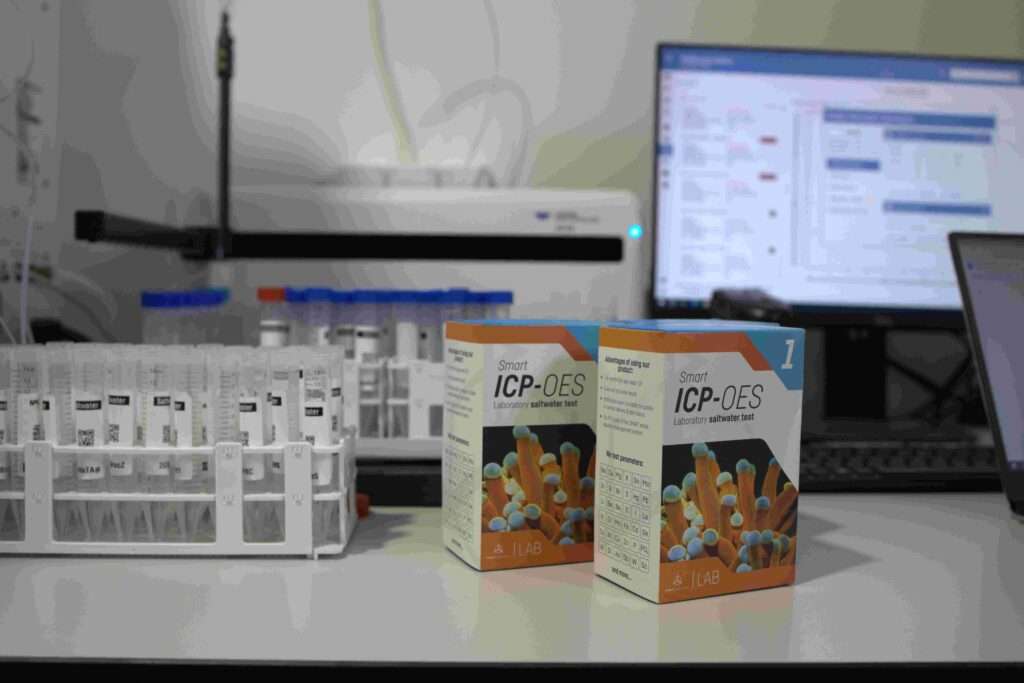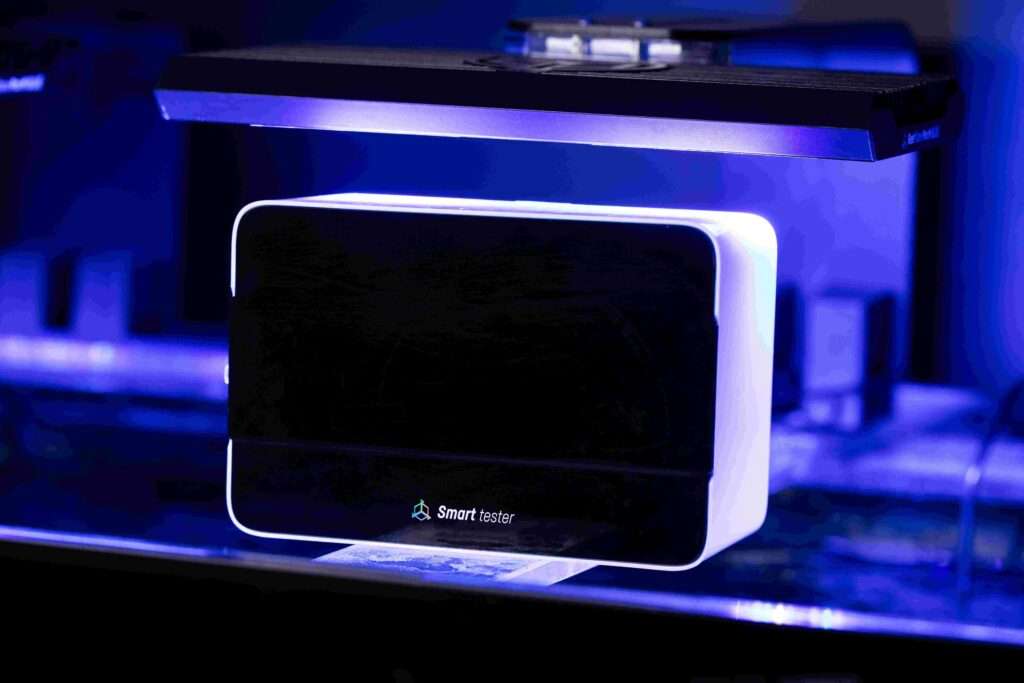Table of Contents
Testing water parameters – Introduction
In this article, I will describe my perspective on testing water parameters in a marine aquarium. Additionally, I will show you some key relationships and try to create a model for the minimum testing frequency. Moreover, testing water parameters is crucial for maintaining a healthy ecosystem in the aquarium. Therefore, automating measurements, when available, significantly simplifies this process, which I highly appreciate in my daily work with the aquarium. Consequently, this article is mainly aimed at beginners to help them understand the topic at a basic level.
Testing water parameters and its frequency in a maturing aquarium
As the aquarium maturing, it is worth regularly monitoring parameters such as PO4, NO3, and pH. Of course, we assume that the saltwater used to fill the tank has appropriate values. However, if you’re unsure about the water quality, it’s a good idea to perform a full ICP test once and measure KH to establish a solid base for future corals.
Therefore, during the maturation process, one water test per week is usually sufficient. At the beginning, the focus is mainly on PO4, NO3, and pH.
Measurements can be recorded manually, but I recommend using the free Smart Reef app. This way, you not only log your results but also receive practical tips for maintaining a marine aquarium.
Additionally, in the article “App for saving reef tank water parameters” you’ll find more details on this topic.
Changes in parameters during maturation
During maturation, PO4 and NO3 levels will initially rise and then begin to decrease. Testing water parameters weekly allows you to track these changes and, most importantly, based on the results, assess when the aquarium has reached maturity. Ideally, pH should stabilize above 8, with optimal values between 8.3 and 8.4.

Why is it worth performing an ICP test?
An ICP test is particularly useful as it allows you to check for excessive levels of contaminants in the water and assess the macro- and microelement levels. Additionally, before introducing organisms into the tank, it’s crucial to ensure the water is in ideal condition. If you are confident about the water quality, you can skip this step, but I personally don’t recommend it—precise actions are always better than relying on assumptions.

Testing water parameters and its frequency in a mature aquarium
In a mature aquarium, the frequency of testing primarily depends on the type of corals you are keeping. If you have soft corals, water testing can be done less frequently, whereas with SPS corals, especially acroporas, more frequent testing is necessary.
Another factor is the current state of the aquarium. If any issues are observed, it is essential to immediately conduct a full set of tests, including an ICP test.
Models of water parameter testing frequency
Let’s now analyze a typical scenario for two types of tanks:
- Soft corals + LPS
- SPS tank
Of course, when creating a model for water parameter testing, we consider a stable tank. However, if anything concerning happens in the aquarium, testing should be carried out much more frequently. Ideally, you should have an automated testing system in place that immediately alerts you if water stability is compromised.
Soft corals + LPS aquarium | |
Type of test | Frequency of testing |
2 times a week | |
1 time a week | |
1 time a week | |
2 times a week | |
1 time a week | |
pH | 2 times a week |
1 time a month | |
Salinity | 1 time a week (with water change) |
Continuous mode | |
SPS aquarium (SPS dominated) | |
Type of test | Frequency of testing |
3 times a day | |
1 time a day | |
1 time a day | |
1 time a day | |
1 time a day | |
Continuous mode using an automated system | |
1 time a month | |
1 time a week (with water change) | |
Continuous mode (ideally, with the option to set alarms on the device) | |
In the tables, we present recommendations for the minimum number of measurements when maintaining the two most popular types of aquariums. First, we will discuss aquariums with soft corals, and then move on to SPS tanks. It’s important to note that in the second example, I recommended continuous pH measurement, as pH has significant daily variability. Therefore, if any issues arise, it’s useful to check the history of this parameter. Additionally, for temperature, I recommend a solution with an alarm that will notify you of sudden temperature spikes. This is especially crucial in SPS tanks, including acroporas, which do not tolerate rapid changes. For this reason, it’s important to monitor parameters, but especially with temperature, to set an alarm. If a heater malfunctions and the temperature drops or increases excessively, particularly during summer, the alarm will immediately notify us, allowing for a quick response and saving the tank.

Summary
In summary, regular testing water parameters is crucial for maintaining a healthy marine aquarium. Monitoring parameters such as PO4, NO3, pH, and KH ensures stable conditions, which are essential for the proper functioning of the ecosystem. Moreover, automation through smart devices makes aquarium management easier, especially for more demanding SPS coral tanks.
As always, I invite you to join the discussion on Social Reef, where you’ll meet marine aquarists from around the world and talk about all things related to our hobby. See you on the platform!
About the author

Marek Protasewicz
Reefkeeping has been my passion for over 10 years now. I love learning. The hobby has taught me many valuable lessons, patience being the best example. Combining work and passion is my path. I run Crazy Coral, a marine aquarium shop, for a number of years. Building this business from the scratch I learnt from my own mistakes at a heavy cost.
Later I managed a project aimed at development of methods for quick growth of Corals in non-natural conditions. The project was carried out by Get Sales, Poland. Presently, I am responsible for distribution strategy at Reef Factory, of which I am a co-founder. The company produces smart devices for marine aquaristics. The last projects I have been involved in are Social Reef and ReefPedia.



